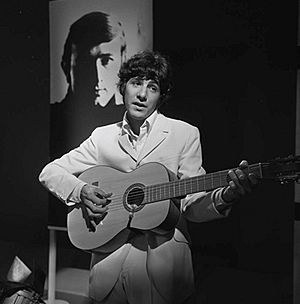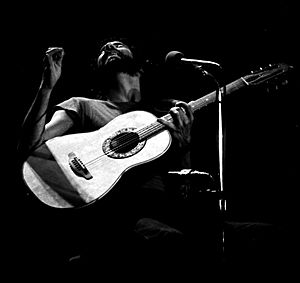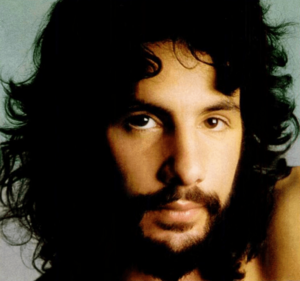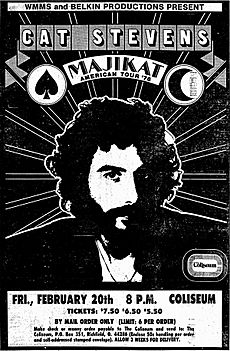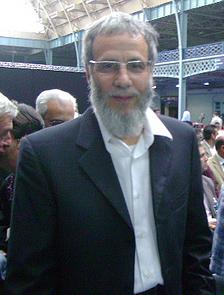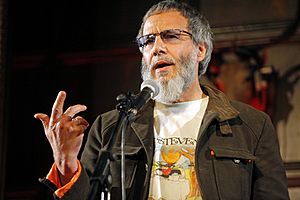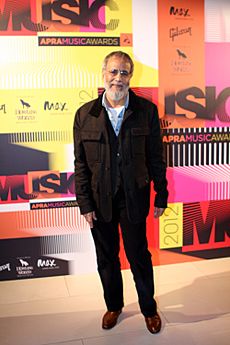Cat Stevens facts for kids
Quick facts for kids
Yusuf Islam / Cat Stevens
|
|
|---|---|
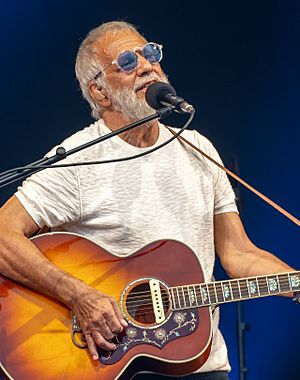
Stevens performing at Glastonbury Festival 2023
|
|
| Background information | |
| Birth name | Steven Demetre Georgiou |
| Also known as |
|
| Born | 21 July 1948 London, England |
| Genres |
|
| Occupation(s) |
|
| Instruments |
|
| Years active |
|
| Labels | |
| Associated acts | Alun Davies |
Yusuf Islam (born Steven Demetre Georgiou; 21 July 1948), also known as Cat Stevens, Yusuf, and Yusuf / Cat Stevens, is a famous British singer and songwriter. He has sold over 100 million records worldwide. His music blends folk, rock, and pop styles. Later in his career, he also created Islamic music. After performing only religious music for two decades, he returned to making other types of music in 2006. He was honored by being added to the Rock and Roll Hall of Fame in 2014. He has also received awards for promoting peace and helping others.
His first album, Matthew and Son (1967), and its main song, "Matthew and Son", both became top 10 hits in the UK. His albums Tea for the Tillerman (1970) and Teaser and the Firecat (1971) sold millions of copies in the US. His 1972 album Catch Bull at Four reached number one on the US Billboard 200 chart. He won awards for songwriting in 2005 and 2006 for "The First Cut Is the Deepest". This song was a hit for four different artists. Other popular songs include "Father and Son", "Wild World", "Moonshadow", "Peace Train", and "Morning Has Broken".
Stevens became a Muslim in December 1977 and changed his name to Yusuf Islam the next year. In 1979, he sold his guitars for charity and paused his music career. He wanted to focus on helping the Muslim community with education and good causes. He later bought back some of his guitars, thanks to his son. In 2006, he released An Other Cup, his first new pop album in 28 years. For this and later albums, he used the name Yusuf. In 2009, he released Roadsinger, and in 2014, Tell 'Em I'm Gone. He also went on his first US tour since 1978. In 2017, he released The Laughing Apple, using the name Yusuf / Cat Stevens again. In 2020, he released Tea for the Tillerman 2, a new version of his classic album. In June 2023, he released a new album called King of a Land.
Contents
Life and Music Journey
Early Years (1948–1965)
Steven Demetre Georgiou was born in London, England, on 21 July 1948. He was the youngest child of a Greek Cypriot father and a Swedish mother. His family lived above their restaurant, the Moulin Rouge, in London's Soho area. Everyone in the family helped out at the restaurant. His parents divorced when he was about eight years old.
Steven became interested in piano at a young age. At 15, he was inspired by the Beatles and started playing the guitar. He convinced his father to buy him his first guitar for £8. He then began writing his own songs. He would sometimes go to the rooftop of his home to listen to music from nearby musicals. He said West Side Story especially influenced him. He also enjoyed art and considered becoming a cartoonist.
He attended local schools where he often got into trouble but excelled in art. He was known as 'the artist boy'. He later decided to pursue music. In 1965, he started performing as "Steve Adams". He wanted to be a songwriter. He was influenced by artists like the Kinks, Bob Dylan, and Nina Simone. He signed a music deal in 1965 and recorded early songs, including "The First Cut Is the Deepest".
Becoming Cat Stevens (1966–1978)
Starting His Music Career
Steven Georgiou began performing his songs in London coffee houses and pubs. He preferred performing alone rather than with a band. He chose the stage name Cat Stevens because a girlfriend said his eyes looked like a cat's. Also, he thought it would be easier for people to remember than his birth name.
In 1966, at 18, producer Mike Hurst discovered him. Hurst helped him get a record deal. Stevens' first songs were very successful. "I Love My Dog" reached number 28 in the UK. "Matthew and Son", from his first album, reached number 2. His album Matthew and Son reached number 7 in March 1967.
Over the next two years, Stevens toured with many different artists. He was seen as a fresh-faced teen idol. He had several hit songs on the British pop charts. His December 1967 album New Masters did not do as well. However, it included "The First Cut Is the Deepest". He sold this song for £30 to P. P. Arnold. It later became a huge hit for several other artists, including Rod Stewart and Sheryl Crow. Forty years later, the song earned him "Songwriter of the Year" awards in 2005 and 2006.
Health Challenges
In 1969, Stevens became very ill with tuberculosis. He was close to death when he was admitted to the hospital. He spent months recovering in the hospital and then a year getting better at home. This time made him think deeply about his life and beliefs. He said that being in the hospital, seeing people die, changed his view.
He started meditating, practicing yoga, and reading about different religions. He also became a vegetarian. During his recovery, he wrote about 40 new songs. Many of these songs appeared on his later albums.
New Musical Style
Stevens was not happy with how his second album sounded. He felt his producer was trying to make it sound too much like his first album. He wanted a more folk rock sound. He managed to end his contract with Deram Records.
After getting better, Stevens recorded his new songs. He found a new producer, Paul Samwell-Smith, who was the bassist for the Yardbirds. Samwell-Smith allowed Stevens to record his music the way he wanted.
Peak of Popularity
Samwell-Smith introduced Stevens to guitarist Alun Davies. Davies was an experienced musician who played folk rock. They became good friends and worked well together.
The first song from Stevens' 1970 album Mona Bone Jakon was "Lady D'Arbanville". Stevens wrote it about his girlfriend, Patti D'Arbanville. The song had a unique sound and became a hit in the UK and the US. It sold over one million copies. Other songs about Patti included "Maybe You're Right". Mona Bone Jakon helped make the solo singer-songwriter style popular.
Mona Bone Jakon led to Stevens' big international album, Tea for the Tillerman. This album became a Top 10 hit on Billboard. It sold over 500,000 copies within six months. Stevens' new folk rock style and relatable lyrics, which talked about everyday life and spiritual questions, became his signature. The album included the hit song "Wild World". This song was written after Patti D'Arbanville moved on. The head of Island Records called it "the best album we've ever released". Other songs included "Hard-Headed Woman" and "Father and Son". In "Father and Son", Stevens sang in two voices, showing the different views of a father and son. By 2001, this album had sold three million copies in the US. It is ranked among Rolling Stone's 500 Greatest Albums of All Time.
After his relationship with D'Arbanville ended, Stevens noticed how it affected his songwriting. He said his songs helped him understand his own feelings.
Stevens continued to have many successes. His 1971 album Teaser and the Firecat reached number two. It sold millions of copies and included hits like "Peace Train", "Morning Has Broken", and "Moonshadow". Stevens said he wrote "Moonshadow" while dancing on rocks by the ocean in Spain.
From 1971 to 1972, Stevens dated singer Carly Simon. They both wrote songs about each other. Simon wrote "Legend in Your Own Time" and "Anticipation" about Stevens. He wrote "Sweet Scarlet" for her.
His next album, Catch Bull at Four (1972), was his fastest-selling album in the US. It reached number one in 15 days and stayed there for three weeks. It was also number one in Australia for fifteen weeks.
Music in Films
In 1970, Stevens recorded "But I Might Die Tonight" for the film Deep End. He also contributed songs to the 1971 film Harold and Maude. However, he was upset when the director used his unfinished demo versions. The film used seven of his songs, but the soundtrack album was not released until 2007.
After he became a Muslim, Stevens stopped allowing his songs to be used in films for a while. But in 1997, the film Rushmore used "Here Comes My Baby" and "The Wind". This showed he was open to his older music being used again. In 2000, "Peace Train" was in Remember the Titans, and "The Wind" was in Almost Famous. "Peace Train" was also in We Are Marshall in 2006.
Later Recordings
His albums in the 1970s continued to sell well, though not as much as his earlier hits. In 1973, Stevens moved to Brazil. He released Foreigner, which was different from his usual music. He wrote all the songs himself and produced it without his band or Samwell-Smith.
In June 1974, Stevens received an award in Australia for selling forty gold records. This was the most ever given to an artist there at the time.
He released Buddha and the Chocolate Box in 1974 and Numbers in 1975.
In April 1977, his Izitso album used more synthesizers, giving it a synthpop sound. "Was Dog a Doughnut" was an early techno-pop song. Izitso included his last chart hit, "(Remember the Days of the) Old Schoolyard", a duet with singer Elkie Brooks.
His last album as Cat Stevens was Back to Earth, released in late 1978. Many compilation albums of his songs were released. The 1975 Greatest Hits sold over 4 million copies in the US. In 2003, he received a Platinum Europe Award for Remember Cat Stevens: The Ultimate Collection.
Becoming Yusuf Islam (1978–Present)
Spiritual Journey and Conversion
While on holiday in Marrakesh, Stevens heard the adhān, the Islamic call to prayer. He was told it was "music for God," which he found very interesting.
In 1976, Stevens almost drowned off the coast of California. He said he prayed, "Oh, God! If you save me I will work for you." He felt a wave carried him back to shore right after. This experience made him search even more for spiritual truth. He had already explored Buddhism, yoga, and other beliefs. His brother, David Gordon, who had converted to Judaism, gave him a copy of the Qur'an as a birthday gift.
Stevens said he would not have picked up the Qur'an himself. But he was deeply moved by its message. He soon began his journey to convert to Islam. This changed his personal and professional life forever.
He formally became a Muslim on 23 December 1977. In 1978, he took the name Yusuf Islam. Yusuf is the Arabic name for Joseph. He said he always loved the name Joseph and was drawn to the story of Joseph in the Qur'an. He stopped his pop music career. He performed one last time at a charity concert in Wembley Stadium on 22 November 1979. This concert benefited UNICEF's International Year of the Child.
Family Life
Yusuf Islam married Fauzia Mubarak Ali on 7 September 1979, in London. They have one son, four daughters, and nine grandchildren. They live in London and also spend much of the year in Dubai.
Life as Yusuf Islam
After becoming a Muslim, he stopped making music for almost 20 years. He said that the music business had become a "chore" rather than an "inspiration." He also wanted to focus on living his life and raising his family.
He estimated in 2007 that he still earned about US$1.5 million a year from his Cat Stevens music. He decided to use this money for charity and education in the Muslim community. In 1983, he founded the Islamia Primary School in London. He also started several Muslim secondary schools. In 1992, he created The Association of Muslim Schools (AMS-UK). He is also the founder and chairman of the Small Kindness charity. This charity helps orphans and families in places like the Balkans, Indonesia, and Iraq. He was also chairman of the charity Muslim Aid from 1985 to 1993.
Travel Issues
On 21 September 2004, Yusuf Islam was flying from London to Washington, D.C. His name was flagged on a "No Fly List" by US authorities. His flight was diverted to Maine, where he was questioned. The next day, he was denied entry and sent back to the UK. US officials said they had "concerns of ties he may have to potential terrorist-related activities." The Israeli government had deported him in 2000 over claims he funded the Palestinian group Hamas. He denied knowingly doing so.
This incident caused an international discussion. The British Foreign Secretary complained to the US Secretary of State. Yusuf Islam believed it might have been a mistake, confusing him with someone else with a similar name. Two years later, in December 2006, he was allowed into the US without any problems for concerts and interviews. He later wrote a song about this experience called "Boots and Sand".
Legal Cases
In October 2004, The Sun and The Sunday Times newspapers claimed he supported terrorism. He sued them for libel. He received a financial settlement and the newspapers published apologies. They stated he had never supported terrorism. Yusuf said he was "delighted by the settlement" and would donate the money to help orphans affected by the 2004 Indian Ocean earthquake and tsunami.
On 18 July 2008, he received damages from the World Entertainment News Network. They had published a story claiming he refused to speak to women who were not wearing a veil. He said this was "an absurdity." He explained that he only asked female presenters to avoid embracing him in public, out of respect for Islamic teachings. He said his daughters, who are well-educated, do not cover their faces and interact normally with society. The money from this lawsuit also went to his Small Kindness charity.
Return to Music
1990s–2006: As Yusuf Islam
Yusuf Islam slowly returned to music in the 1990s. His first new recordings used only percussion instruments. They featured lyrics about Islamic themes. He built his own recording studio, Mountain of Light Studios. He also sang on a song called "God Is the Light" with the group Raihan.
After his friend, the Foreign Minister of Bosnia and Herzegovina, was killed, Yusuf Islam performed at a benefit concert in Sarajevo in 1997. He also recorded a benefit album.
He realized there were not many educational resources for children about Islam. So, he wrote and produced a children's album, A Is for Allah, in 2000. He also started his own record label, "Jamal Records". He donates a part of his earnings to his Small Kindness charity.
In 2000, when his Cat Stevens albums were re-released, he agreed to interviews. He explained that he had stopped performing in English due to a misunderstanding of Islamic faith. He said, "This issue of music in Islam is not as cut-and-dried as I was led to believe." He also appeared in a VH1 documentary about his life.
Yusuf Islam has said that his decision to leave pop music might have been too sudden. He felt that if he had simply removed things considered forbidden in his performances, he could have continued to make music and educate people about Islam.
In 2003, he recorded "Peace Train" again for a compilation CD. He also performed "Wild World" at Nelson Mandela's 46664 concert with Peter Gabriel. This was his first public performance in English in 25 years.
In December 2004, he and Ronan Keating released a new version of "Father and Son". It reached number two on the charts. The money from this song went to the Band Aid charity.
On 21 April 2005, Yusuf Islam spoke and performed in Abu Dhabi. He said there is much misunderstanding about Islam. He hoped to communicate through music. He noted that there are no strict rules against instruments in the Qur'an. He felt that healthy entertainment was acceptable. He performed two songs, one in Arabic and English, and another new song with an R&B sound.
In a 2005 press release, he explained his return to recording: "After I embraced Islam, many people told me to carry on composing and recording, but at the time I was hesitant... I guess it is only now, after all these years, that I've come to fully understand and appreciate what everyone has been asking of me."
In early 2005, he released "Indian Ocean" about the 2004 tsunami disaster. Proceeds went to help orphans through his charity. He also played guitar on Dolly Parton's 2005 album Those Were the Days.
Yusuf Islam credits his son, Muhammad Islam, for his return to secular music. His son brought a guitar back into their home, and Yusuf started playing again. Muhammad, whose professional name is Yoriyos, also created the art for Yusuf's album An Other Cup.
In May 2006, the BBC aired a documentary called Yusuf: The Artist formerly Known as Cat Stevens. It showed his career as Cat Stevens, his conversion, and his return to music. In December 2006, he performed at the Nobel Peace Prize Concert in Norway. He also gave a concert in New York City. His long-time guitarist, Alun Davies, joined him.
2006–2017: As Yusuf
An Other Cup and Performances
In March 2006, Yusuf finished his first new pop album since 1978. An Other Cup was released in November 2006, marking 40 years since his first album. A single, "Heaven/Where True Love Goes", was also released. The album was produced with Rick Nowels. The artist was credited as "Yusuf", with a note saying "the artist formerly known as Cat Stevens". Yusuf wrote most of the songs.
He actively promoted the album. He told the BBC, "It's me, so it's going to sound like that of course... This is the real thing." He explained that "Yusuf" was more personal than "Yusuf Islam." He said the album cover, showing a single cup, represented a bridge between East and West.
In April 2007, BBC1 broadcast a concert by Yusuf in London. It was his first live performance in London in 28 years. He played new songs and old favorites like "Father and Son" and "Peace Train".
In July 2007, he performed at a concert in Germany to benefit Desmond Tutu's Peace Centre. He also performed at Live Earth in Hamburg, singing classic Cat Stevens songs. He performed at the Peace One Day concert in London in September 2007. In 2008, he contributed "Edge of Existence" to a charity album supporting indigenous rights.
Roadsinger and Tours
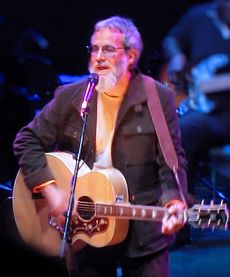
In January 2009, Yusuf released a song called "The Day the World Gets Round" to help children in Gaza. He worked with German bassist Klaus Voormann. Proceeds went to charities like UNESCO and Save the Children.
On 5 May 2009, Yusuf released Roadsinger, a new pop album. He promoted it on American and UK television shows. He performed new songs like "World O'Darkness" and "Boots and Sand". He also performed the title song from Roadsinger.
He announced a world tour to promote the album. He performed at Island Records' 50th Anniversary concert in London. In late 2009, he went on his "Guess I'll Take My Time Tour" in Europe. In June 2010, he toured Australia and New Zealand for the first time.
On 30 October 2010, Yusuf appeared at a rally in Washington, DC, singing "Peace Train" alongside Ozzy Osbourne.
On 2 March 2011, Yusuf released "My People" as a free download. This song was inspired by the Arab Spring uprisings. He launched a new tour website for his first European tour in over 36 years, from May to June 2011.
In May 2012, Moonshadow, a musical featuring his music, opened in Melbourne, Australia. In October 2013, Yusuf was nominated for the Rock and Roll Hall of Fame again. He was inducted in April 2014 by Art Garfunkel. He performed "Father and Son", "Wild World", and "Peace Train" at the ceremony.
Tell 'Em I'm Gone and Tours
On 15 September 2014, Yusuf announced his new album, Tell 'Em I'm Gone, released on 27 October 2014. He also announced two short tours in Europe and North America. The North American tour was his first since 1976. On 4 December 2014, he played his first public US concert since the 1970s.
In 2015, Yusuf performed in Chile and Wales. On 1 June 2016, he released a new song, "He Was Alone", and its video. This song was part of a fundraising campaign for child refugees. He performed it live at a charity concert in London.
On 26 July 2016, Yusuf announced he would be part of the Global Citizen Festival in New York City. On 9 August 2016, he announced "A Cat's Attic Tour" in North America. This tour celebrated the 50th anniversary of his first single, "I Love My Dog". He donated a portion of ticket sales to his charity Small Kindness, UNICEF, and the International Rescue Committee to help child refugees. The tour also included shows in the UK.
2017–Present: As Yusuf / Cat Stevens
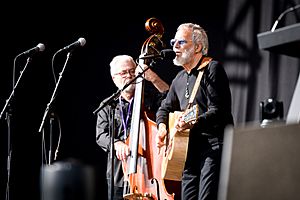
On 15 September 2017, he released his fifteenth studio album, The Laughing Apple. This was his first record using the Cat Stevens name since 1978. The album was nominated for a Grammy Award for Best Folk Album. In July 2018, Yusuf signed with BMG Rights Management. On 29 March 2019, Yusuf performed in Christchurch, New Zealand, at a service for victims of the Christchurch mosque shootings.
On 3 March 2020, Yusuf played a benefit concert at the O2 Arena in London. On 28 May 2020, he announced his next album, Tea for the Tillerman 2, released on 18 September 2020. This album celebrated the 50th anniversary of the original. It featured new versions of the old songs. On 25 September 2020, Yusuf was a guest on the BBC's Desert Island Discs.
In 2021, Yusuf / Cat Stevens recorded a new version of "Peace Train" with over 25 musicians from 12 countries.
2023: European Tour and King of a Land
In June 2023, Yusuf performed shows in Berlin, Hamburg, Rome, and Marbella. He also made his first appearance at Glastonbury Festival on 25 June 2023. He played on the Pyramid Stage, performing his songs and some Beatles hits.
On 16 June 2023, he released King of a Land, a new studio album. This album has influences from children's music and religious music.
His Impact
Artists who have said Cat Stevens influenced their music include Paul McCartney of The Beatles, Dolly Parton, Peter Gabriel, and Carly Simon. They have praised the quality of his music.
Awards and Honors
Helping Others
- 2003: World Award for "humanitarian relief work helping children and victims of war".
- 2004: Man of Peace Award from the World Summit of Nobel Peace Laureates for promoting peace and condemning terrorism.
- 2009: Honorary Award from the German Sustainability Award.
- 2015: Global Islamic Economy Awards for his contributions to peace through art.
- 2015: Steiger Award for his commitment to charity projects.
Honorary Degrees
- 2005: Honorary doctorate from the University of Gloucestershire for his work in education and humanitarian aid.
- 2007: Honorary doctorate (LLD) from the University of Exeter for his humanitarian work and improving understanding between Islamic and Western cultures.
Music Awards
- 2019: Inducted into the Songwriters Hall of Fame.
- 2017: Grammy Award nomination for Best Folk Album.
- 2015: Lifetime Achievement Award at the BBC Radio 2 Folk Awards.
- 2014: Inducted into the Rock and Roll Hall of Fame.
- 2007: Ivor Novello Award for Outstanding Song Collection.
- 2007: ECHO "Special Award for Life Achievements as a Musician and Ambassador Between Cultures".
- 2006: ASCAP Songwriter of the Year for "The First Cut Is the Deepest" (second time).
- 2006: Ranked 49th in Paste's "100 Best Living Songwriters".
- 2005: ASCAP Songwriter of the Year and Song of the Year for "The First Cut Is the Deepest".
Music Albums
- As Cat Stevens
- 1967: Matthew and Son
- 1967: New Masters
- 1970: Mona Bone Jakon
- 1970: Tea for the Tillerman
- 1971: Teaser and the Firecat
- 1972: Catch Bull at Four
- 1973: Foreigner
- 1974: Buddha and the Chocolate Box
- 1975: Numbers
- 1977: Izitso
- 1978: Back to Earth
- As Yusuf Islam
- 1995: The Life of the Last Prophet
- 1999: Prayers of the Last Prophet
- 2000: A Is for Allah
- 2001: Bismillah
- 2002: In Praise of the Last Prophet
- 2003: I Look I See
- 2008: I Look, I See 2
- 2014: The Story of Adam and Creation
- As Yusuf
- 2006: An Other Cup
- 2009: Roadsinger
- 2014: Tell 'Em I'm Gone
- As Yusuf / Cat Stevens
- 2017: The Laughing Apple
- 2020: Tea for the Tillerman 2
- 2023: King of a Land
Books Written
- The Life of The Last Prophet, 1996.
- Prayers of The Last Prophet, 1998/2000.
- Why I Still Carry A Guitar: My Spiritual Journey from Cat Stevens to Yusuf, 2014.
See also
 In Spanish: Cat Stevens para niños
In Spanish: Cat Stevens para niños
- List of peace activists
- List of best-selling music artists
- List of converts to Islam
- Rolling Stone's 500 Greatest Albums of All Time


